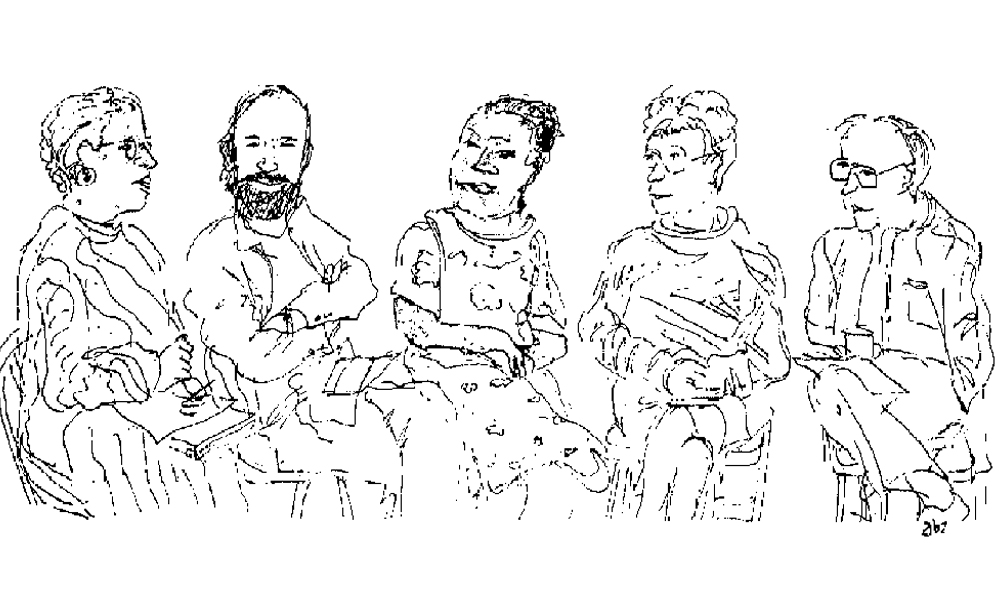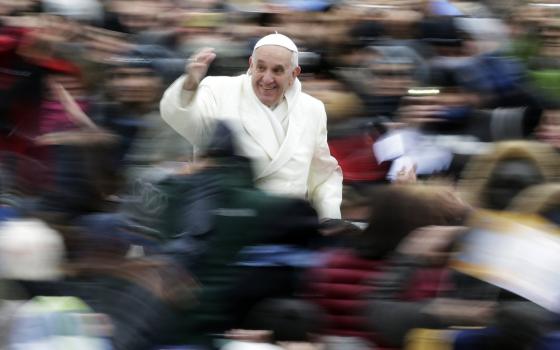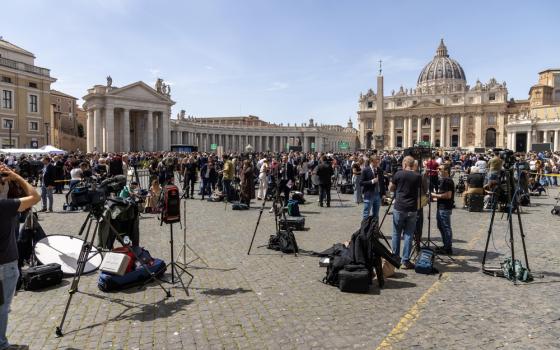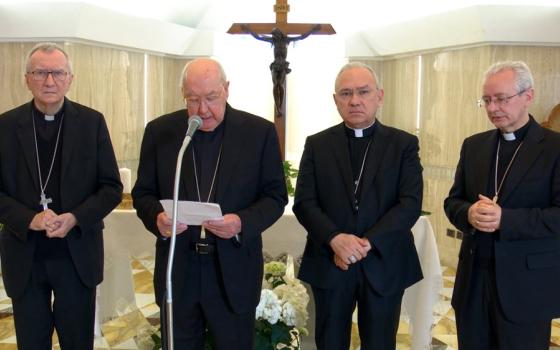
The sorry state of the Catholic conversation about same-sex love prompts us to make a constructive proposal. If we have any hope of moving the discussion in a justice-seeking direction, we need a new approach to the problems of homohatred and heterosexism that begins not with church teaching but with real people’s lives. Rehashing old arguments on the morality of sexual activity, about which there is substantial and deeply hurtful disagreement, is useless.
It is time to listen to the experiences and expertise of people who speak with integrity rather than authority.
We are Catholic lesbian/queer women who enjoy our sexuality and rejoice in our relationships. We love out loud. It is time to listen to the experiences and expertise of people who speak with integrity rather than authority, whose lives are not circumscribed by clericalism, people who are free to be honest and transparent.
We need wisdom from many Catholic perspectives, not limiting "Catholic" to institutional church teaching on matters on which the vast majority of Catholics have left the hierarchy behind. It is time to grow up and use "I" statements instead of making pronouncements or pretending to be above the fray.
Therefore, we declare a moratorium on ecclesial-speak and begin anew with human-to-human, Catholic-to-Catholic conversation about sexuality, not just homosexuality, in the frame of global justice. The crying needs of the world — ecocide, violence against women, war, racism and poverty — do not permit us the luxury of endless debates about bedroom issues.
We open this discussion because we are barred structurally due to our gender from Catholic decision-making. We have been disinvited, or told we have been passed over, more times than we can count by Catholic institutions because of being out and proud. Ironically, we each have other areas of expertise — social ethics, ecclesiology, liturgy, religion and politics — that are lost on the larger church when our voices are silenced.
We simply do not have the conditions for a useful conversation if churchmen talk with one another and at or about the rest of us.
Wisdom on sexuality is not found primarily in documents, lectures and books that emanate from the institutional church and its employees. Misogyny and kyriarchy make that impossible. The extent to which women and many people of color are not in the discussion, and the plain fact that our experiences are not reflected in the discourse render those sources moot. Likewise, the interstructured ways in which racism, white supremacy, colonialism, ableism and the like combine with sexism and heterosexism to undergird ecclesial structures mean that we simply do not have the conditions for a useful conversation if churchmen talk with one another and at or about the rest of us.
The current Catholic conversation in the United States sounds like wheels spinning in deep sand. For example, Catholic Church officials still dither and wring their hands over whether long partnered, now even married, same-sex couples are living in sin, a matter long settled in the minds of most American Catholics. Rehearsing it only draws attention to how pitiful the arguments are against the obvious grace of committed love. It is hard to imagine what insights they would have into dating, casual sex or other everyday matters.
We respectfully but insistently ask clerics to please be quiet, listen and learn about some of the issues our children face: the many ways there are to be transgender; how to live in a nonbinary world; how to avoid sexually transmitted diseases; how to date and partner safely and with pleasure; what it means to unexpectedly fall in love with someone of the same sex or to be in love with someone whose gender identity changes; what it means to be asexual; how to cope with the insidious violence too often encountered in intimate relationships.
Young people know how complex and confusing it all is. They get few if any helpful Catholic resources. It is no wonder young people become "nones" or "never agains" when it comes to religion. We can do better, but not if we waste time and talent on empty rhetoric and bridges that go nowhere.
Kirkridge Retreat and Study Center in Bangor, Pennsylvania, recently celebrated 40 years of LGBTIQ faith-based programs. The great Jesuit theologian and gay priest John McNeill provided invaluable leadership there for many years when he was banned from Catholic institutions for being out and proud. His ashes are buried at Kirkridge. We celebrated his memory with reverence and delight. McNeill started an important conversation when he wrote The Church and the Homosexual in 1976. But Catholics never as much as hear his name whispered, even by Jesuits, in contemporary conversations about same-sex love.
The initial meeting of the Conference for Catholic Lesbians was held in November 1982 at Kirkridge. The keynote address by Mercy Sr. Theresa Kane was memorably supportive. Her kind, pastoral, and prophetic words of comfort and challenge to that group, at a moment when she was in her own deep weeds with the Vatican, are seared on the hearts of scores of women. She admitted that she did not know much about our topic, but that she had gone to a New Ways Ministry symposium and met some same-sex couples. She saw love there, she told us, and as a Christian she had the responsibility to sit up and take notice. Notice she did, and we are forever in her debt for affirming our love.
By contrast, the stale, "he said he said" character of the current debate is unhelpful. To be blunt, the sight of clerics duking it out on same-sex love is not pretty. Catholics understand that the world in general — universities, governments, businesses, families, other religions — are rapidly coming to accept same-sex love as healthy, good, natural and holy. At the same time, society at large is reading about clergy sexual abuse, diplomats who are secreted home to Rome with pending kiddie porn charges, and even a priest who served jail time for cross-burning, neglected to pay restitution, but apparently wasn't vetted for ministry any better than the rest.
Fortunately, there are plenty of same-sex loving Catholics, and our allies, who are engaged in forward-looking conversations, albeit excluded from institutional church deliberations. The recent Dignity Convention featured conversations about diversity, children, aging and interstructured analysis of oppression. These are Catholic social justice priorities that LGBTIQA groups address when they get beyond what Catholic moral theologian Daniel Maguire called aptly "pelvic zone" matters.
Advertisement
Lots of Catholics will be in St. Louis for the October 2017 "Rolling the Stone Away: Generations of Love and Justice" conference. We will join hundreds of our colleagues from myriad Christian groups to reflect on and celebrate decades of successful work on same-sex issues. Many denominations now welcome everyone and ordain LGBTIQA clergy because of the struggles led by pioneers like Janie Spahr (Presbyterian), Carter Heyward (Episcopalian), and Nancy Wilson (Metropolitan Community Churches). The United Methodists just commissioned their first openly nonbinary trans deacon.
Let us leave aside the old ecclesial frames and opt for listening to the stories of one another's lives.
Catholics have a lot to share despite the stalled out conversation among clerics. Ask our ecumenical colleagues with whom we have been rolling away the stone for years. They look to us for theological sophistication because they know we know how to think about the Divine and the world in tandem. They expect us to contribute liturgies, like same-sex marriage rites and celebrations of trans people renaming themselves, because they know our church does ritual well. They want our insights on moral and ethical matters because they trust not the institutional church, but groups like the Catholic Worker and many women's religious orders that are in the vanguard of social struggle in nonviolent and peace-seeking ways.
Our proposal is an invitation. Let us leave aside the old ecclesial frames and opt for listening to the stories of one another's lives. Then bring those stories to contemplative prayer and vigorous discussion. Let the best scholarship in the social and biological sciences inform our conversations. Let theological light shine from informed sources both Catholic and beyond. Then, even though we will inevitably disagree on some points, we can get on with the work of being a useful faith community confronting the crying needs of the world — ecocide, violence against women, war, racism and poverty — together. As the Irish-American, gay Catholic activist Brendan Fay put it so poetically, "It's about the sheets and the streets." Now that's a good place to start a conversation.
[Mary E. Hunt is a feminist theologian who is co-founder and co-director of the Women's Alliance for Theology, Ethics and Ritual (WATER) in Silver Spring, Maryland. Jamie L. Manson is NCR books editor. She received her Master of Divinity degree from Yale Divinity School, where she studied Catholic theology and sexual ethics. Marianne Duddy-Burke is executive director of DignityUSA.]







